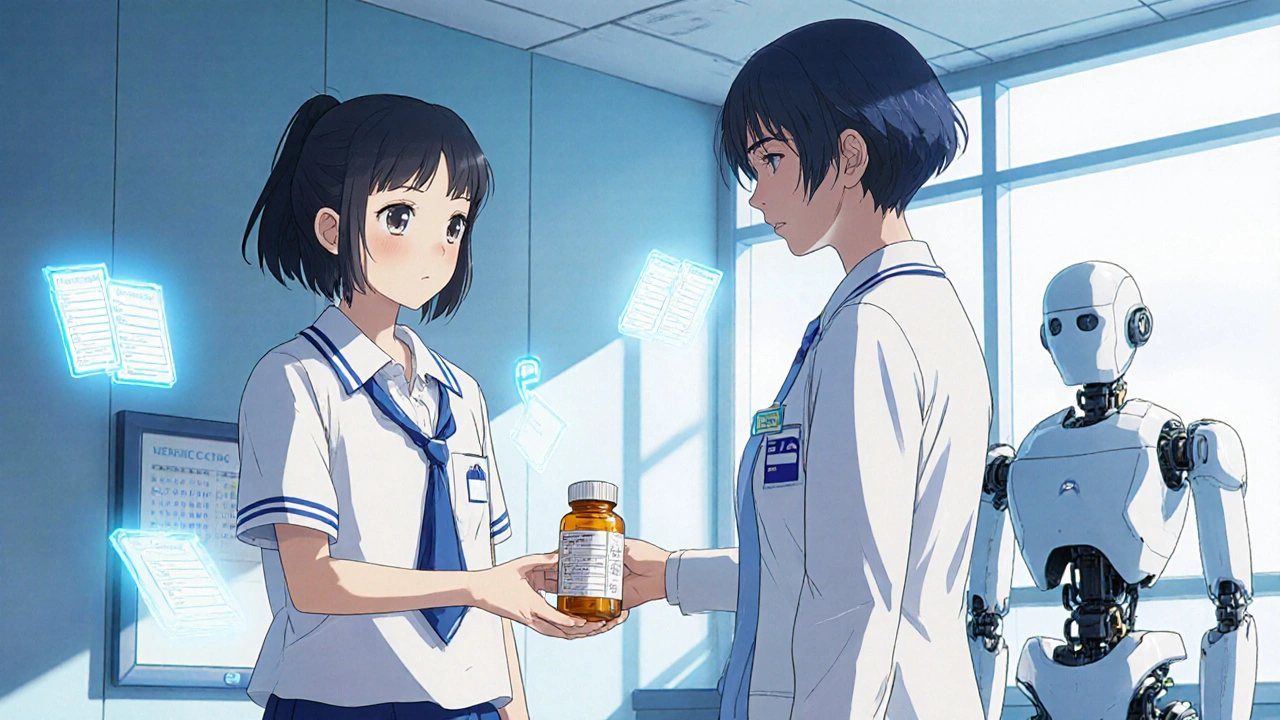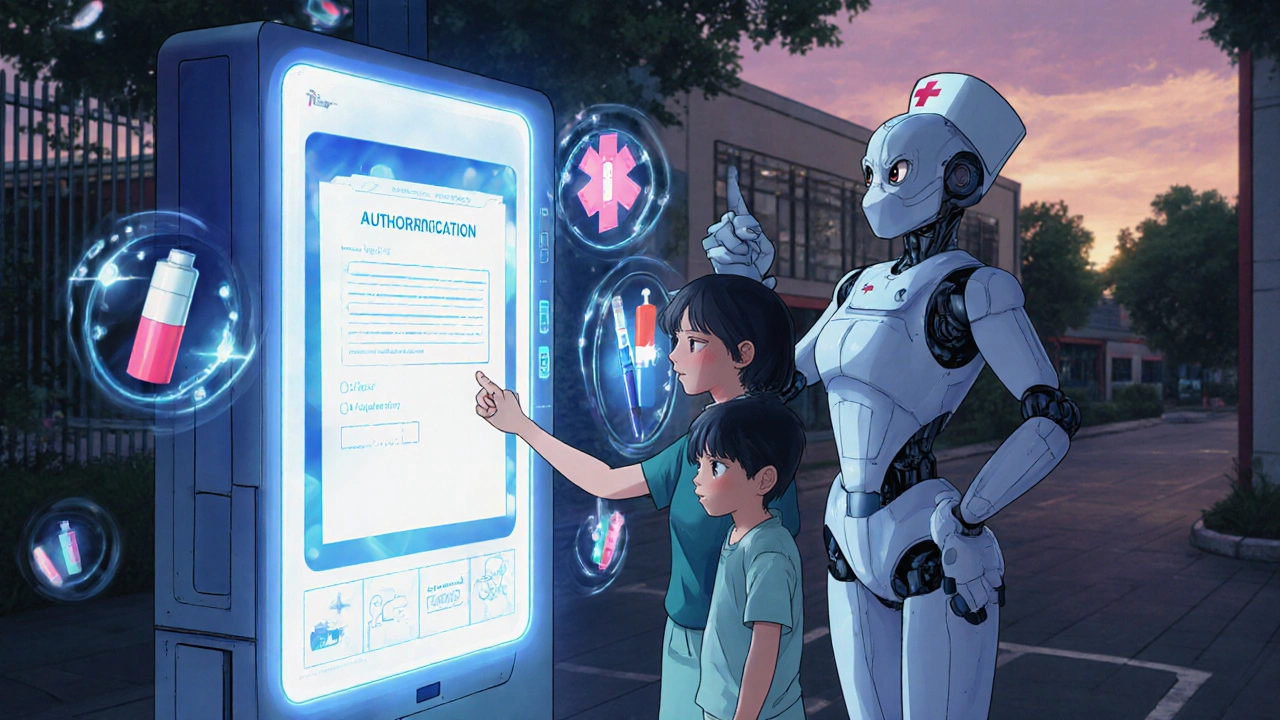 Nov, 14 2025
Nov, 14 2025
When your child takes medication for asthma, ADHD, diabetes, or another chronic condition, the school day shouldn’t be a guessing game. You trust the school to help keep them safe-but without clear steps from you, things can go wrong. A missed dose, a wrong pill, or a delayed response to a reaction can turn a routine day into a medical emergency. The good news? With the right preparation and communication, schools can safely give your child the medicine they need-exactly when and how it’s prescribed.
What You Must Do Before the First Day of School
You can’t just drop off a pill bottle and assume everything’s covered. Every school district requires formal paperwork, and missing even one piece can delay or block medication access. Start by getting two forms: a Physician/Parent Authorization Form and a Parent Consent Form. Both must be signed by your child’s doctor and by you. The doctor’s signature isn’t optional-it’s the law in 47 states. Without it, the school nurse can’t legally give the medicine.The form needs more than a name and dosage. Your doctor must include: the full medication name, exact dose (e.g., 5 mg, not "one pill"), how often to give it, the route (oral, inhaler, nasal spray, injection), the start and end dates, possible side effects, and any special instructions like "take with food" or "avoid sunlight." If your child uses an inhaler, the form must specify the exact brand and strength-like "Fluticasone 110 mcg, two puffs twice daily." Generic descriptions won’t cut it.
Don’t wait until August. New York City Public Schools recommends submitting forms by June 1. Why? Schools need time to train staff, update electronic records, and order supplies. If you wait until the first week of school, your child might go without medication for days. That’s not just inconvenient-it’s risky.
How to Deliver Medication to School
Never let your child carry their own medication unless the school has approved it in writing. Even then, most schools require a special self-administration form signed by both you and the doctor. In New York, students can only self-administer asthma inhalers or epinephrine auto-injectors if they’ve passed a supervised training session and have written permission. In California, they must demonstrate competency by practicing with a trainer in front of the nurse.When you drop off the medicine, bring it in the original, manufacturer-labeled bottle. No Ziploc bags, no pill organizers, no unlabeled containers. The label must show your child’s full name, the medication name, dosage, and prescribing doctor’s name. Expired pills? Throw them out. Schools won’t accept them. Refrigerated medicines like insulin or some ADHD medications must be kept in a locked, dedicated fridge at 2-8°C (36-46°F). These fridges are separate from food-no yogurt or lunches allowed.
You must hand the medication directly to the school nurse or designated staff member. No dropping it in a backpack, no leaving it at the front desk. Both you and the nurse must sign a receipt confirming what was received, when, and in what condition. This isn’t bureaucracy-it’s legal protection for everyone involved.
The 5 Rights of Safe Medication Administration
School nurses follow a strict system called the 5 Rights to prevent errors:- Right student-Double-checking name and date of birth against the form
- Right medication-Matching the bottle label to the written order
- Right dose-Verifying the amount (e.g., 10 mg, not 20 mg)
- Right route-Giving it by mouth, inhaler, injection, or patch as ordered
- Right time-Administering within 30 minutes before or after the scheduled time, unless the doctor says otherwise
These steps aren’t suggestions-they’re mandatory under the National Association of School Nurses’ 2023 framework. Schools that follow them reduce medication errors by up to 75%. Most public schools now use electronic medication administration records (eMARs), which automatically flag mismatches between orders and what’s being given. These systems cut documentation errors by 57%.

What Happens If Your Child Refuses to Take Their Medicine?
It happens. Kids get scared, embarrassed, or just don’t want to stand out. If your child refuses, the school nurse will not force them. Instead, they’ll contact you immediately. Some schools have a 15-minute window to try again. If the refusal continues, they’ll call you again and ask for your input.Don’t dismiss this. A child who refuses medication is at higher risk of asthma attacks, seizures, or panic episodes. Experts say students who understand their condition and feel involved in their care miss 32% fewer doses. Talk to your child about why the medicine matters. Use simple language: "This inhaler helps you breathe when you run. If you don’t use it, you might have to go home." Some schools now use apps that send you a text when your child takes their medicine-early pilots in California show a 27% drop in parent calls asking "Did they take it?"
Changes in Medication? Tell the School Right Away
If your child’s dose changes, a new medicine is added, or they start having side effects like dizziness, nausea, or mood swings, you must notify the school within 24 hours. Don’t wait for the next parent-teacher meeting. Don’t assume the doctor’s office already called. The National Association of School Nurses reports that 18% of medication errors happen because schools weren’t told about changes.Even small changes matter. If your child’s ADHD medication was switched from a once-daily capsule to a twice-daily tablet, the school schedule must adjust. If your child’s insulin dose was lowered, the nurse needs to update the eMAR and watch for signs of low blood sugar. Keep a copy of the updated prescription and give it to the nurse. Don’t rely on your memory.

End of Year: Clean Up and Retrieve
Schools don’t store leftover medication over the summer. Frederick County Schools and New York State both require parents to pick up all unused medicines by August 31. If you don’t, the school will dispose of them safely-no exceptions. This isn’t about being strict. It’s about safety. Expired or unclaimed meds can get mixed up, stolen, or accidentally taken by another student.Before summer break, check your child’s medication log. Did they finish their antibiotics? Is there leftover asthma inhaler? Bring everything home. If you’re going on vacation, ask the nurse if they can hold it for a few extra days-but don’t assume they will. Get it in writing.
Why This Matters More Than Ever
The number of children needing school-administered medication is rising fast. The National Association of School Nurses predicts a 22% increase between 2023 and 2028, mostly due to more kids being diagnosed with anxiety, depression, and autoimmune disorders. Schools are responding with better training, digital records, and even biometric checks to make sure the right child gets the right pill.But none of it works without you. You’re the link between the doctor’s office and the school nurse. Your attention to detail-filling out forms correctly, delivering medicine properly, reporting changes quickly-is what keeps your child safe. Schools can’t do it alone. They rely on you to be accurate, timely, and involved.
And if you ever feel unsure? Ask the school nurse. They’re trained for this. They want to help. Don’t wait for a problem to happen. Get the forms early. Double-check the labels. Talk to your child. Stay in touch. Your child’s health depends on it.
Can my child carry their own inhaler or EpiPen to school?
Yes, but only if the school has a signed Self-Medication Release Form from both you and your child’s doctor. In New York and California, students must also complete a supervised training session to prove they can use it correctly. Even then, the school nurse must still be notified and have a backup device on hand.
What if the school refuses to give my child their medication?
They can’t legally refuse if all paperwork is complete and current. If they do, ask for the school’s written medication policy and request a meeting with the school nurse and principal. You can also contact your district’s special education office-schools are required under federal law to provide necessary health services to students with disabilities, including those on medication.
Do I need to renew the medication form every year?
Yes. In 32 states, including New York, medication orders must be renewed annually. Even if the prescription hasn’t changed, the school needs a new signed form from your doctor. Don’t assume last year’s form still works. Submit it early to avoid gaps in care.
Can the school give my child over-the-counter medicine like ibuprofen?
Only if you’ve completed a separate OTC medication form and the school has written permission from your doctor. Many schools require a doctor’s note even for Tylenol or Advil because they’re still medications with risks. Never send OTC meds without paperwork.
What if my child has a reaction at school?
The school nurse will follow the emergency plan you provided on the authorization form. This includes calling you immediately, contacting emergency services if needed, and documenting everything. Make sure your emergency contacts are up to date and that the nurse has a copy of your child’s allergy list or reaction history.
Latrisha M.
November 15, 2025 AT 22:40Just want to say this is one of the clearest guides I’ve seen on school meds. I’m a nurse in a rural district and we deal with this daily. The 5 Rights aren’t just a checklist-they’re a lifeline. I’ve seen kids go without insulin because a form was missing a signature. Don’t underestimate the paperwork. It’s not red tape, it’s protection.
Jamie Watts
November 17, 2025 AT 16:00Anyone else notice how schools are turning into pharmacies now? They got nurses doing med checks like it’s a Walmart pharmacy line. Next thing you know they’ll be giving out antidepressants before recess. My kid’s on Adderall and I still won’t let the school touch it unless I’m there. They don’t know what’s in those pills. They don’t know what they’re doing.
David Rooksby
November 19, 2025 AT 09:54Oh wow so now we’re supposed to hand over our child’s meds like we’re dropping off dry cleaning? And if we don’t do it by June 1st the school will just let our kid have a seizure? This is insane. Who’s liable if the nurse messes up the dosage? Not me. Not the school. It’s always the parent who gets sued. And why do they need a doctor’s signature for every little thing? That’s just another way to make us jump through hoops while they sit on their hands waiting for the next lawsuit. I’ve read about schools in Texas where the nurse gave a kid the wrong med because the label was smudged. Smudged. Not even a typo. A smudge. And now we’re supposed to trust these people with our kid’s life?
Rachel Wusowicz
November 21, 2025 AT 08:27They’re not just giving meds-they’re running a covert pharmaceutical operation under the guise of "care." Did you know some districts are using biometric scanners now? Fingerprints to verify the kid? That’s not safety-that’s surveillance. And who’s feeding that data? Who’s tracking who took what and when? It’s all in the eMARs-electronic medication administration records. Those aren’t just logs. They’re databases. And databases get hacked. Or sold. Or subpoenaed. I’ve seen the forms. They ask for your child’s full medical history, allergies, even mental health notes. That’s not healthcare. That’s data harvesting with a stethoscope.
Deepak Mishra
November 22, 2025 AT 17:31OMG I JUST REALIZED MY KID’S INHALER EXPIRED LAST MONTH AND I FORGOT TO TELL THE SCHOOL 😭😭😭 I’M SUCH A BAD PARENT 😭😭😭 THEY’RE GOING TO KILL HIM BECAUSE I WAS TOO LAZY TO CHECK THE DATE 😭😭😭
Diane Tomaszewski
November 23, 2025 AT 04:18I appreciate how this breaks it down. My daughter’s on seizure meds and the first year we didn’t know any of this. She missed two weeks. I wish someone had told me to just talk to the nurse. She’s not a bureaucrat. She’s the person who actually cares.
John Mwalwala
November 23, 2025 AT 19:01Look at the 22% projected increase in school-administered meds by 2028. That’s not just more diagnoses. That’s systemic. The CDC and Big Pharma have been quietly redefining normal behavior as pathology. Anxiety? ADHD? Autoimmune? Those aren’t just medical conditions-they’re market segments. And now schools are the frontline distribution centers. The forms? The eMARs? The training? It’s all part of the infrastructure. You think they’re protecting kids? They’re normalizing pharmaceutical dependency from age five. And the parents? They’re just signing the consent forms without reading the fine print. That’s not care. That’s compliance.
Dan Angles
November 24, 2025 AT 13:02As a school administrator, I can confirm that these protocols are not optional. They are mandated under Section 504 of the Rehabilitation Act and the Individuals with Disabilities Education Act. Failure to comply exposes the district to federal liability. The forms, the documentation, the training-all of it is legally required to ensure equitable access to education for students with medical needs. The nurse is not a pharmacist. She is a licensed healthcare professional fulfilling a civil right. Please treat her as such.
Daniel Stewart
November 26, 2025 AT 09:10There’s a deeper truth here: we’ve outsourced parenting to institutions. We used to give our kids medicine at home. We knew their rhythms. We watched their faces. Now we hand over a bottle and walk away, trusting strangers with the most fragile part of our lives. And we call it progress. But progress without intimacy is just automation. And automation without love? That’s not safety. That’s surrender.